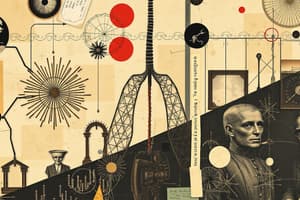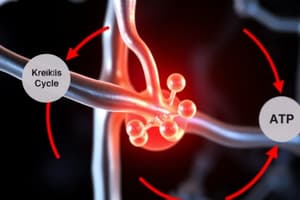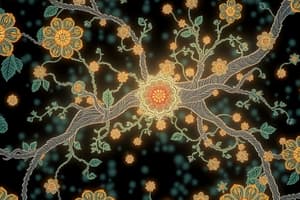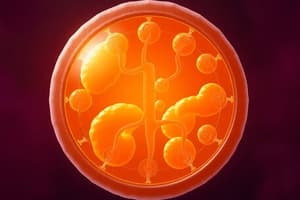Podcast
Questions and Answers
Like photosynthesis, cellular respiration begins with an electron transport chain.
Like photosynthesis, cellular respiration begins with an electron transport chain.
False (B)
Cellular respiration that proceeds in the presence of oxygen is called aerobic respiration.
Cellular respiration that proceeds in the presence of oxygen is called aerobic respiration.
True (A)
Oxygen is the final electron acceptor during anaerobic respiration.
Oxygen is the final electron acceptor during anaerobic respiration.
False (B)
Cellular respiration occurs in the mitochondria.
Cellular respiration occurs in the mitochondria.
Mitochondria have their own DNA.
Mitochondria have their own DNA.
Just like a chloroplast, the stroma separates the inner and outer membranes of the mitochondria.
Just like a chloroplast, the stroma separates the inner and outer membranes of the mitochondria.
The Kreb's cycle comes after glycolysis, during cellular respiration.
The Kreb's cycle comes after glycolysis, during cellular respiration.
Cellular respiration begins with the absorption of sunlight by the mitochondria.
Cellular respiration begins with the absorption of sunlight by the mitochondria.
The first reaction of the Kreb's cycle produces citric acid.
The first reaction of the Kreb's cycle produces citric acid.
One molecule of glucose can be used to produce up to 38 molecules of ATP.
One molecule of glucose can be used to produce up to 38 molecules of ATP.
The Krebs cycle produces 4 ATP.
The Krebs cycle produces 4 ATP.
Whereas plants perform photosynthesis, animals perform cellular respiration.
Whereas plants perform photosynthesis, animals perform cellular respiration.
Two NADPH are made during glycolysis.
Two NADPH are made during glycolysis.
Glycolysis uses two ATP to make?
Glycolysis uses two ATP to make?
Cellular respiration in the presence of oxygen is called?
Cellular respiration in the presence of oxygen is called?
The correct order of the stages of cellular respiration is?
The correct order of the stages of cellular respiration is?
Where are the electron transport chains of cellular respiration located?
Where are the electron transport chains of cellular respiration located?
The final electron acceptor at the end of cellular respiration is?
The final electron acceptor at the end of cellular respiration is?
Which of these is the chemical formula for cellular respiration?
Which of these is the chemical formula for cellular respiration?
What is the ion gradient made by moving hydrogen ions across the inner membrane using energy from the electron transport chain called?
What is the ion gradient made by moving hydrogen ions across the inner membrane using energy from the electron transport chain called?
In the presence of oxygen, one glucose molecule has the energy to make up to?
In the presence of oxygen, one glucose molecule has the energy to make up to?
Flashcards are hidden until you start studying
Study Notes
Cellular Respiration Overview
- Cellular respiration begins with glycolysis, followed by the Krebs cycle and electron transport.
- Aerobic respiration refers to cellular respiration that occurs in the presence of oxygen, while anaerobic respiration does not.
- Oxygen serves as the final electron acceptor in aerobic respiration, not in anaerobic respiration.
Mitochondria Functions
- The mitochondria are the site of cellular respiration and are often called the powerhouse of the cell.
- Mitochondria possess their own DNA, distinguishing them from other organelles.
Key Processes and Cycles
- The Krebs cycle, following glycolysis, starts with the production of citric acid.
- During glycolysis, 2 ATP are consumed to yield a net gain of 2 ATP, along with 2 NADH and 2 pyruvate.
ATP Production
- A single molecule of glucose can yield up to 38 ATP molecules during cellular respiration.
- The Krebs cycle results in the production of 4 ATP molecules.
Electron Transport Chain
- The electron transport chain is located in the inner membrane of mitochondria and creates a chemiosmotic gradient by moving hydrogen ions, using energy derived from the chain.
Chemical Formula
- The chemical equation depicting cellular respiration is represented as:
C6H12O6 + 6 O2 → 6 CO2 + 6 H2O.
Functional Differences
- Plants conduct photosynthesis to produce their own energy, while animals rely on cellular respiration to convert glucose into usable energy.
Studying That Suits You
Use AI to generate personalized quizzes and flashcards to suit your learning preferences.




